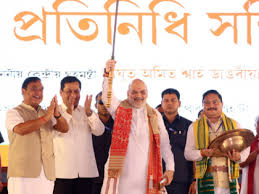
Amit Shah Pledges to Eliminate Infiltration and Secure India’s Borders

 :
| Updated On: 30-Aug-2025 @ 3:38 pm
:
| Updated On: 30-Aug-2025 @ 3:38 pmSHARE
Union Home Minister Amit Shah, while addressing a special programme in Guwahati on Friday to commemorate the birth centenary of Assam’s first non-Congress Chief Minister Golap Borbora, reaffirmed the BJP’s strong commitment to making Assam and India completely free of infiltrators. Shah’s address underlined both the historical and contemporary challenges posed by illegal migration, while also highlighting the role played by Borbora in shaping Assam’s political consciousness against infiltration.
Shah emphasized that Prime Minister Narendra Modi’s recently announced high-powered Demography Mission is a significant and bold step in tackling the long-standing issue of illegal foreigners residing in India, particularly in Assam and other northeastern states. He explained that the mission aims to scientifically assess and identify infiltrators so that demographic imbalances caused by illegal immigration can be effectively addressed.
Recalling historical precedents, Shah praised Golap Borbora’s decisive 1978 initiative to cleanse the voter list of illegal names. That exercise successfully detected nearly 37,000 infiltrators, an act that became the catalyst for the famous Assam Agitation, a mass movement against illegal immigration that reshaped the state’s political and social landscape. According to Shah, Borbora’s courageous stand and people-centric governance made him a pioneering leader whose legacy remains relevant today.
Turning to present-day politics, Shah sharply criticized opposition parties for their resistance to the ongoing SIR voter roll cleansing exercise, which seeks to update and verify Assam’s electoral rolls by removing illegal voters. He described the opposition’s stance as a symptom of “political moral degradation,” accusing them of prioritizing vote-bank politics over national interest and the state’s demographic security.
Praising the Assam government led by Chief Minister Himanta Biswa Sarma, Shah said the current administration has taken decisive action against infiltrators and encroachment, thereby protecting indigenous rights and resources. He noted that although Golap Borbora was not politically aligned with the BJP, Sarma’s governance style reflected Borbora’s socialist legacy of putting people first, thereby carrying forward his ideals in spirit.
In his tribute to Borbora’s welfare measures, Shah highlighted key initiatives undertaken during his tenure as Chief Minister, such as free education up to Class 10 and the waiver of land taxes for the poor. He stressed that such people-centric welfare policies were ahead of their time and continue to serve as guiding principles for good governance.
Further, Shah drew parallels between Borbora’s inclusive governance and the Modi government’s efforts to honor leaders who have been historically overlooked. He specifically mentioned initiatives to commemorate Sardar Vallabhbhai Patel and Netaji Subhas Chandra Bose, asserting that the BJP and its leadership remain committed to giving due recognition to forgotten heroes who made immense contributions to the nation.
In conclusion, Amit Shah positioned the fight against infiltration as both a tribute to Borbora’s political legacy and a key pillar of BJP’s governance philosophy. He called upon the people of Assam to support the government’s initiatives, assuring them that the BJP remains unwavering in its mission to secure Assam’s identity, safeguard its indigenous population, and ensure a future free of infiltration.